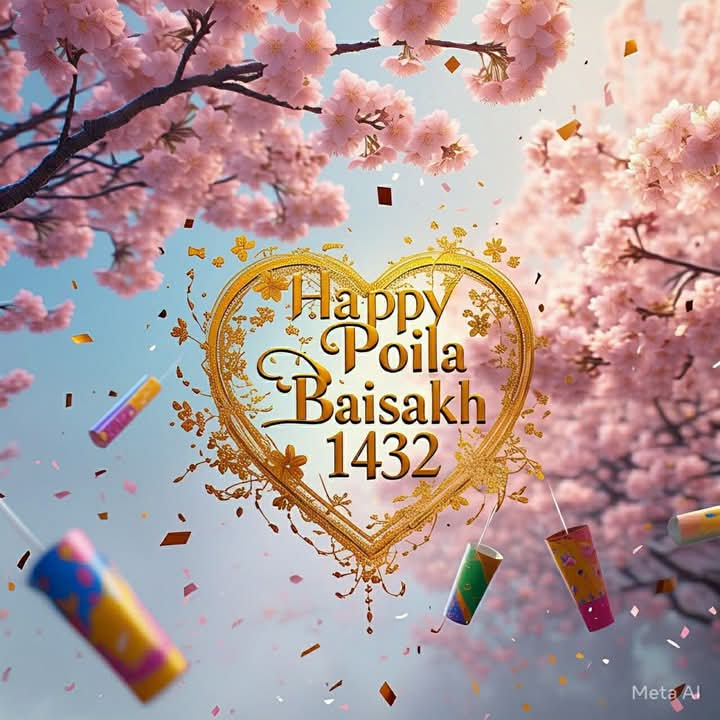The relationship between the Bengali identity and Poila Boishakh, the Bengali New Year, is profound and inseparable. Poila Boishakh is not merely a date on a calendar; it is a vibrant embodiment of Bengali culture, a collective expression of their heritage, and a unifying force that transcends geographical boundaries and religious affiliations. This auspicious day serves as a powerful reminder of what it means to be Bengali, reinforcing a shared history, language, traditions, and aspirations for the future.
Poila Boishakh: A Cultural Cornerstone:
For Bengalis worldwide, Poila Boishakh is arguably the most significant cultural festival. It acts as an annual reaffirmation of their Bengali-ness, a day dedicated to celebrating their unique cultural tapestry. The very essence of the festival – from the language used in greetings (“Shubho Noboborsho”) to the traditional attire worn (sarees with red and white borders, Panjabis), the music that fills the air (Rabindra Sangeet, folk songs), and the culinary delights savored (Panta Bhat, Mishti Doi) – is deeply rooted in Bengali traditions and aesthetics.
The vibrant colors that dominate the celebrations, particularly red and white, are symbolic and deeply ingrained in Bengali culture. The intricate “alpana” designs that adorn homes and streets are a traditional art form passed down through generations. The fairs and “melas” that spring up during this time showcase Bengali handicrafts, folk art, and traditional entertainment, providing a platform for the preservation and promotion of these cultural expressions.
Language and Literature: The Soul of Bengal Celebrated:
The Bengali language, a source of immense pride and a cornerstone of Bengali identity, takes center stage during Poila Boishakh. The exchange of greetings in Bengali, the recitation of Bengali poetry, and the singing of Bengali songs are integral parts of the celebrations. The works of literary giants like Rabindranath Tagore and Kazi Nazrul Islam, whose contributions are deeply woven into the fabric of Bengali culture, resonate particularly strongly on this day. Their songs, often celebrating the arrival of spring and new beginnings, form the soundtrack of Poila Boishakh.
The very act of celebrating Poila Boishakh in Bengali, adhering to the Bengali calendar, and embracing Bengali customs reinforces the importance of the language in maintaining cultural identity, especially for Bengalis living outside of Bengal. It serves as a vital link to their roots and a means of transmitting their linguistic and literary heritage to future generations.
Traditions and Rituals: Connecting to the Past:
Poila Boishakh is steeped in traditions and rituals that connect contemporary Bengalis to their past. The “Haal Khata” tradition, where businesses open new ledgers and renew relationships with customers, is a practice that has been carried forward for generations, highlighting the community-oriented nature of Bengali society. The preparation and sharing of traditional Bengali food are not just culinary experiences; they are acts of cultural continuity, preserving recipes and flavors that define Bengali cuisine.
The “Mangal Shobhajatra” in Bangladesh, a UNESCO-recognized Intangible Cultural Heritage, is a powerful example of a contemporary tradition rooted in Bengali artistic expression and a collective desire for peace and prosperity. The intricate paper mache creations depict elements of Bengali folklore and symbolize hope and courage, showcasing the dynamism and evolving nature of Bengali cultural traditions.
A Unifying Force Beyond Religious Lines:
One of the most remarkable aspects of Poila Boishakh is its ability to transcend religious boundaries and unite all Bengalis in a shared celebration. Hindus, Muslims, Christians, and people of all faiths participate in the festivities with equal enthusiasm. This inclusive nature underscores the secular and deeply cultural essence of the festival, where Bengali identity takes precedence over religious affiliations. It is a testament to the shared heritage and the strong sense of community that binds Bengalis together.
Poila Boishakh in the Diaspora: Maintaining Identity in a Global World:
For the large Bengali diaspora scattered across the globe, Poila Boishakh takes on an even greater significance. It becomes a crucial occasion to reconnect with their roots, celebrate their cultural identity in a foreign land, and pass on their traditions to their children. Bengali associations and communities worldwide organize Poila Boishakh events, recreating the festive atmosphere of Bengal with cultural programs, traditional food, and gatherings that foster a sense of belonging and shared identity. In these diasporic celebrations, the Bengali language, music, dance, and cuisine serve as powerful anchors, maintaining a strong connection to their homeland and cultural heritage.
Economic and Social Significance:
Beyond its cultural importance, Poila Boishakh also holds economic and social significance within Bengal. The “Haal Khata” tradition marks the beginning of the new financial year for many Bengali businesses, symbolizing hope for prosperity and new beginnings. The fairs and melas provide a platform for local artisans and businesses to showcase their products and contribute to the local economy.
Socially, Poila Boishakh is a time for families and friends to come together, strengthening community bonds and fostering a spirit of togetherness. The exchange of greetings and gifts, the sharing of meals, and participation in communal celebrations reinforce social cohesion and a sense of collective identity.
The Resilience of Bengali Identity:
The enduring popularity and vibrant celebration of Poila Boishakh year after year highlight the resilience and strength of Bengali identity. Despite historical and political changes, the core elements of Bengali culture, as embodied in this festival, continue to thrive. It is a testament to the deep-rooted love for their language, traditions, and artistic expressions that defines the Bengali people.
Poila Boishakh – The Heartbeat of Bengali Identity:
Poila Boishakh is far more than just the first day of the Bengali calendar. It is the heartbeat of Bengali identity, a vibrant and unifying celebration that encapsulates the rich cultural heritage, linguistic pride, and shared traditions of the Bengali people. It is a day when Bengalis across the world come together to reaffirm their cultural roots, celebrate their unique identity, and look forward to the future with hope and optimism. The traditions, rituals, and joyous spirit of Poila Boishakh serve as a powerful reminder of what it means to be Bengali, strengthening the bonds of community and ensuring the continuity of their rich cultural legacy for generations to come.

